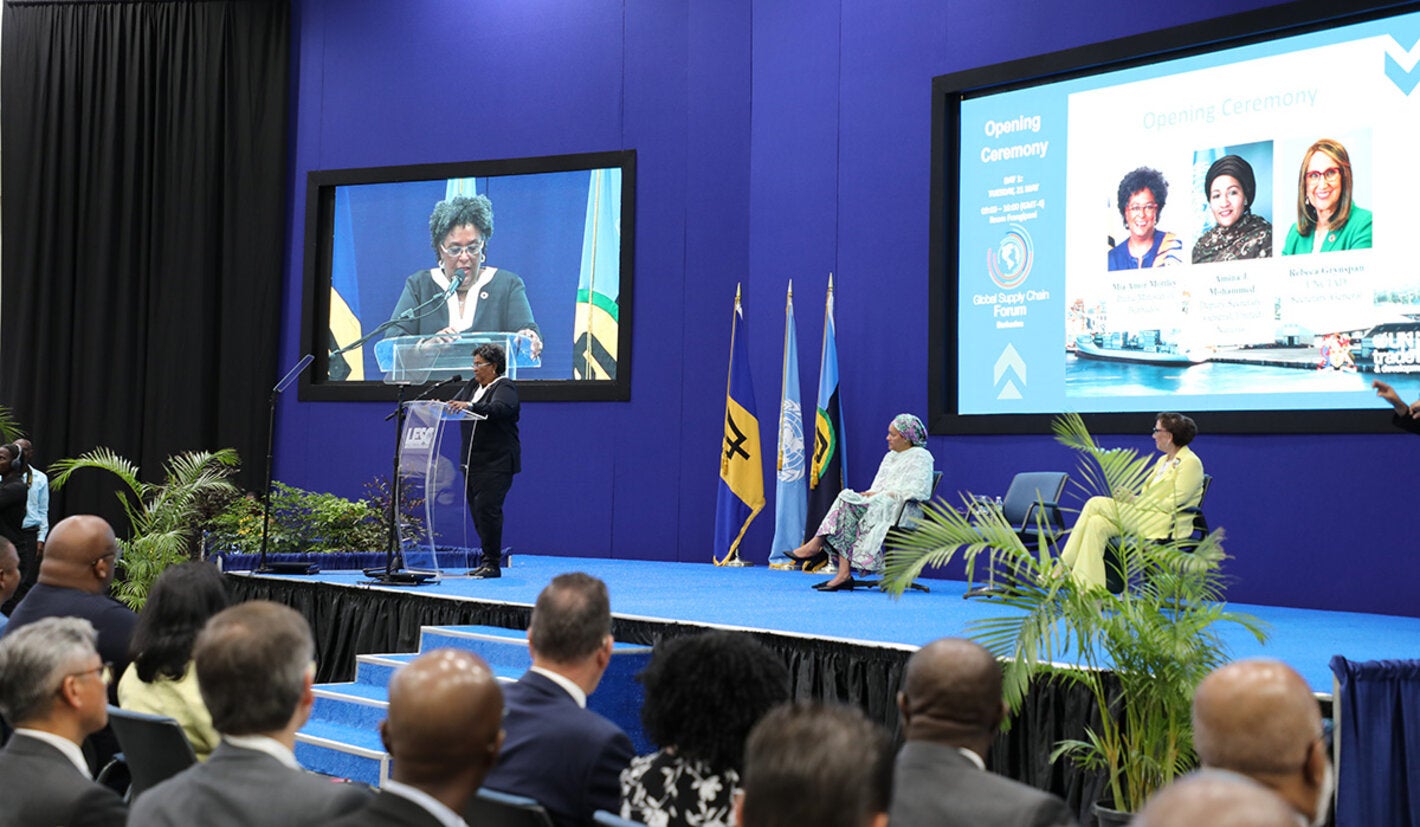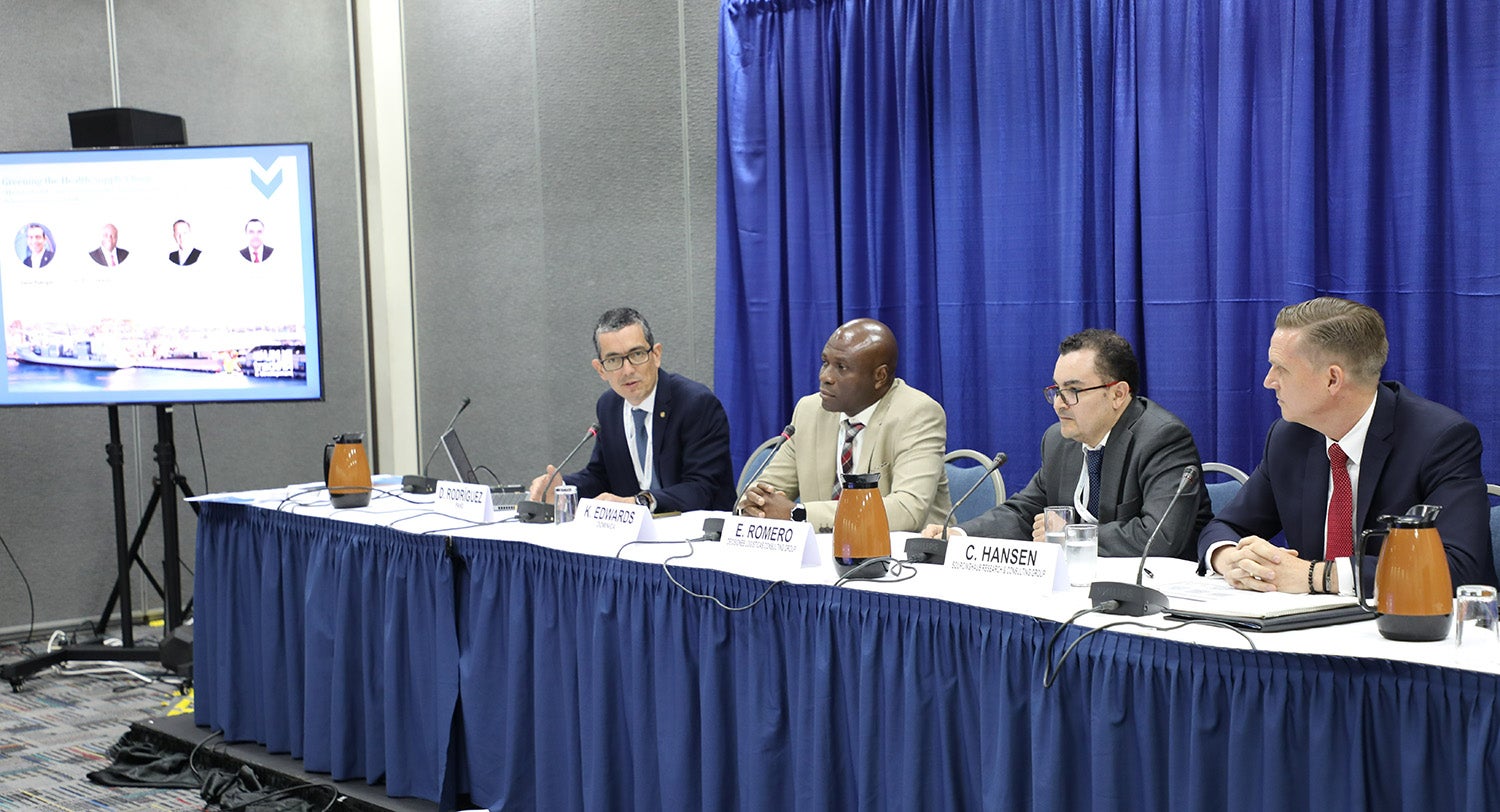
Bridgetown, Barbados, 22 May 2024 (PAHO) — The Pan American Health Organization (PAHO) led one of the side events at the inaugural Global Supply Chain Forum held in Barbados from 21-24 May 2024. The event, titled "Greening the Health Supply Chain: How to Build a More Sustainable, Resilient, and Cost-Effective Logistics to Deliver Vaccines and Medicines in Latin America and the Caribbean," took place on 22 May 2024.
The session was led by Daniel Rodriguez, PAHO's Director of Procurement and Supply Management. Rodriguez facilitated a very informative discussion with three panelists, including Hon. Kent Edwards, Parliamentary Secretary, Ministry of Health, Wellness and Social Services, Dominica; Carsten Hansen, Executive Managing Director, SourcingHaus Research and Consulting Group; and Enrique Romero, Logistics Optimization Specialist, Decisiones Logisticas Consulting Group.
During the discussion, the panelists outlined some of the main challenges faced with the current supply chain, such as logistical bottlenecks, supply chain disruptions due to natural disasters, environmental impacts including carbon footprint, and high transportation costs in the Caribbean region. Innovative and collaborative approaches were presented to reduce the emissions footprint and achieve a more cost-effective supply chain in the region leveraging the PAHO Regional Revolving Funds..
The PAHO panel discussion emphasized the critical linkages between climate change and public health, the integration of sustainability within supply chain operations, and provided concrete strategies to achieve PAHO's 50% emission reduction target by 2030.
Specific solutions noted were the consolidation of shipments, establishing a hub, and leveraging regional supply. These various strategies and initiatives could assist with building a more resilient and cost-effective logistics system for the delivery of vaccines and medicines.
PAHO shared their experience with measuring their Greenhouse gas (GHG) emission baseline across their supply chain and setting concrete emission reduction targets. PAHO presented their comprehensive and concrete supply chain emissions reduction strategy, which consists of five strategic entry points for emissions reduction:
- Encouraging supplier sustainability actions
- Promoting a modal shift to low-emission transportation options
- Reducing packaging and promoting the use of sustainable materials
- Enhancing shipping consolidation
- Leveraging low-emission transportation solutions
PAHO's leadership in "walking the talk" on supply chain emission reduction is demonstrated through their clear and concise roadmap towards reducing emissions. They have set ambitious targets to reduce emissions by 50% by 2030 and have outlined actionable steps to achieve this goal.
A key message from the discussion was: "By fostering innovation and collaboration, we can ensure that vaccines and medicines are delivered efficiently and effectively, while also minimizing our environmental impact."
“With collaboration, everything is possible. That means collaboration from governments, not only the Ministry of Health, but also from Customs, the public sector, manufacturers, UN agencies, and regional integration organizations. We need to find common opportunities to collaborate,” said Rodriguez.
PAHO remains committed to advancing sustainable practices in health logistics, recognizing the pivotal role they play in improving health outcomes across Latin America and the Caribbean.
Key Message: It is possible to reduce costs and emissions in the supply chain. PAHO's strategy aims to achieve both emissions and cost reduction to benefit PAHO member states, thereby increasing accessibility to public health services and taking concrete and measurable climate action.
The first-ever Global Supply Chain Forum, organized by the United Nations Conference on Trade and Development (UNCTAD) and the Government of Barbados, brought together government officials, business leaders, and experts to explore sustainable and resilient transport and logistics, improved connectivity, and trade facilitation.




